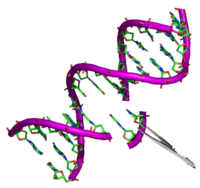
Photo from wikipedia
Abstract Water pollution and the global spread of pathogens pose unexpected and considerable challenges to human and environmental health. Recent developments in DNA-based engineering systems show various real-world applications in… Click to show full abstract
Abstract Water pollution and the global spread of pathogens pose unexpected and considerable challenges to human and environmental health. Recent developments in DNA-based engineering systems show various real-world applications in ecosystem restoration, medical diagnostics, immune regulation, and drug delivery, providing new opportunities to address these challenges. DNA materials are essentially different from non-biological materials and act as a robust molecular building block with exceptional attributes; these attributes include its genetic function, biocompatibility, nanoscale controllability, programmability, and molecular recognition capability. Unlike traditional systems using separate strategies, the unique properties of DNA molecules enable their use as universal substrates to develop diverse engineering systems and offer a flexible solution concept to current challenges. Here, we outline principles and approaches for the use of three DNA-based engineering subsystems—DNA tracers, DNA barcodes, and DNA hydrogels—in improving human and environmental health in the context of pollution identification, pathogen detection, and medical treatment, with some discussion of typical examples to highlight the focus of current research and envision potential development direction. We believe that this review will contribute to the rational design of DNA-based tracer, barcode and hydrogel system, and the successful integration of these subsystems that are intrinsically interconnected will further demonstrate their synergistic effects on environmental remediation and medical care.
Journal Title: Nano Today
Year Published: 2020
Link to full text (if available)
Share on Social Media: Sign Up to like & get
recommendations!